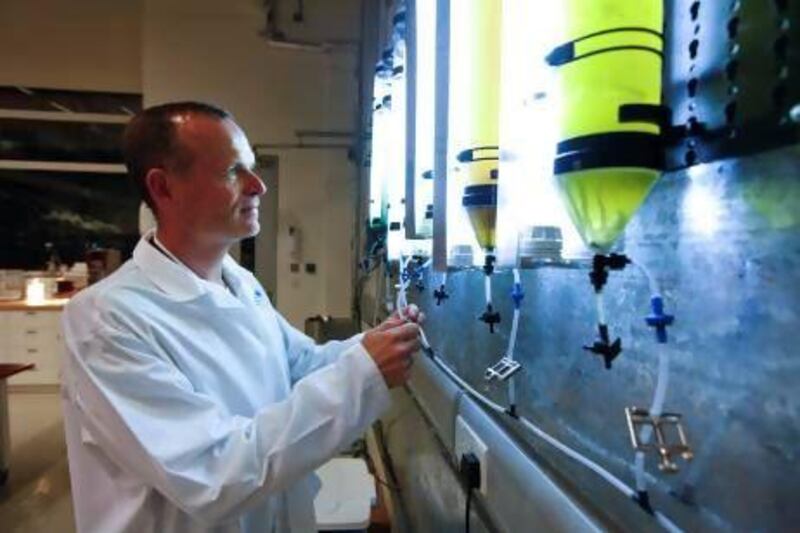The UAE has been recognised as an emerging force in the competitive biotechnology industry.
Biotechnology companies worldwide boosted profit by 37 per cent to a record US$5.2 billion last year, according to Ernst & Young.
This year, for the first time, the UAE was included in the Scientific American Worldview Report and Bio-Innovation Scorecard, a list issued by the Biotechnology Industry Organisation (Bio) of 54 countries demonstrating biotech innovation and potential.
The UAE clinched 40th spot, behind China and just ahead of Russia. The Emirates was also named the top Arabian Gulf state on the list, ahead of Qatar at 42nd, Saudi Arabia at 45th and Kuwait at 53rd.
The United States and Denmark finished first and second, respectively, on this year's scorecard, the third year in a row the two countries have taken top honours, in that same order.
When evaluated, each country received a score in six categories - IP, intensity, enterprise/support, education/workforce, foundations, and policy and stability.
The year marks the fifth anniversary of the scorecard.
The UAE finished particularly strongly in the enterprise/support category, claiming 11th spot.
"For a country of that size to perform that well in that area, it's sort of astounding," says Mike May, the editorial director of the Scientific American Worldview Scorecard.
The UAE finished eighth in the foundations category, in part because of its impressive infrastructure quality, entrepreneurship and opportunity.
"The UAE is doing some of the most interesting research right now on some of the hottest topics out there," says Matthew Carr, the managing director for the industrial and environmental sections at Bio.
Some of the UAE's innovative work in industrial biotech echoes the cutting-edge research being presented at this month's World Congress of Industrial Biotechnology, the world's largest industrial biotechnology event for leaders, investors and policymakers in biofuels, biobased products and renewable chemicals.
This year's congress will take place on June 16 through June 19 in Montreal, Canada. The conference will be celebrating its 10th anniversary.
Last year, companies based in the UAE such as Epygen, an enzyme biotechnology company headquartered in Dubai, and researchers at the Masdar Institute of Science and Technology focused on producing sustainable jet fuel from plants, took the spotlight at the conference.
Epygen has been working on enhanced oil recovery that involves finding enzymes that can be injected down into oil wells to bring out more oil than normally expected. The company is exploring less hazardous biological substitutes for harsh chemicals used in the crude extraction process.
This is one of many projects at Epygen. Others include work related to pulp and paper enzymes, textile enzymes, biofuels and food enzymes.
Among scientific projects at Masdar, Jens Ejbye Schmidt, a professor in biofuels on the chemical engineering programme at the institute, has been working on a project to convert organic waste into fuel , while his colleague, Raed Hashaikeh, has been working to create a new kind of biodegradable polymer that can be used in biotechnology in the form of engineered tissue.
Masdar experts have also constructed an agricultural project aimed at producing sustainable aviation biofuels by pumping water from the sea into agricultural ponds.
Etihad Airways, Boeing, Honeywell and Safran funded the project's research. The Abu Dhabi Government funded the demonstration project.
While these are just two examples of cutting-edge research in the UAE, many other companies are also attending major industry conferences and taking advantage of the resources offered in the Emirates in particular.
There are several factors at play - geography, infrastructure, economic benefits and available capital, for example - that are positioning the country as a global sweet spot for biotech innovation.
Geography is a big draw for the UAE. With 150 shipping lines at the Emirates' ports and various options for airline flights, the area promises accessibility, said David Harris, the director of international logistics services in the Dubai office of foreign direct investment, during a two-day competitiveness forum, Health Care and Access to Innovative Medicines in the UAE, in Dubai in November.
Mr Harris also pointed to ongoing meetings taking place to bolster venture capital sources supporting home-grown research in the UAE.
Tax-free zones are also particularly attractive and experts predict this may draw even more companies to the area in the future. Clinical trials can also be conducted for a fraction of the cost in the US or Europe.
During the two-day forum in November, Sari Al Abdulrazzak, the manager of Deloitte & Touche Strategy Consulting in the UAE, said running clinical trials in the Emirates costs only about 50 per cent of what it does in the US or Europe.
The UAE is laying the groundwork for future innovation.
"A lot of what's going on in the UAE for biotechnology is preparation," says Mr May. The country is working hard to position itself as "a force in biotechnology".
However, there are some hurdles to overcome.
"One example that shows they're not quite there yet is the category of education/workforce," Mr May says, pointing out that the Emirates is lacking in the number of PhD graduates in life sciences as well as tech-savvy employees.
The UAE finished last in this area.
Peter Pitts, the president of the US food and drug administration's centre for medicine in the public interest, agrees. The UAE is "a good launching pad for companies wanting to do business in GCC", he says.
"However, the big issue is whether intellectual capital exists in the UAE to be more than a home for international biotech developments," he adds, emphasising more leaders of innovation are needed.
Mr Pitts says the UAE has figured out how to smartly partner the pharmaceutical industry. However, there needs to be more invested in academics.
"The good news is that the conversation is happening at the industry level," Mr Pitts says.
"Emiratis have proven that they are willing to do business and want to be good partners, but to reach that next level, more intellectual capital is needed."





